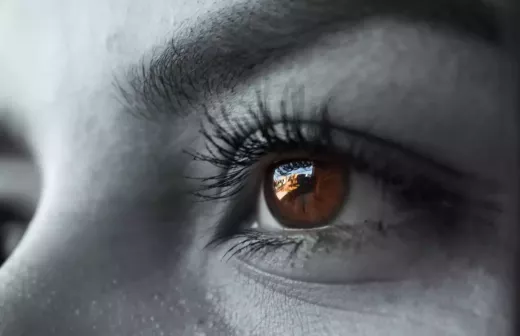What are blue light glasses and why do you need them?
Blue light glasses have become increasingly popular in recent years due to the excessive use of digital devices. These glasses are designed to filter out the blue light emitted from screens, which is known to cause eye strain, headaches, and disrupted sleep patterns. Blue light is a high-energy light that is emitted by digital devices such as smartphones, laptops, and tablets. Prolonged exposure to blue light can cause damage to the retina, which can lead to long-term vision problems.
Blue light glasses are designed to block or filter out blue light, reducing the amount of blue light that enters your eyes. This can help to reduce eye strain, headaches, and improve the quality of sleep. Blue light glasses can be worn by anyone who spends prolonged hours in front of screens, including students, office workers, and gamers.
If you're someone who spends several hours staring at screens each day, investing in a pair of blue light glasses can be a great way to protect your eyes and improve your overall health.
The effects of blue light on eye health
Blue light has been shown to have both short-term and long-term effects on eye health. Short-term effects of blue light exposure include eye strain, headaches, and disrupted sleep patterns. These symptoms can occur after just a few hours of screen time and can be particularly noticeable at night when the blue light can interfere with the production of melatonin, a hormone that helps regulate sleep.
Long-term effects of blue light exposure include damage to the retina, which can lead to long-term vision problems such as age-related macular degeneration. The retina is the part of the eye that is responsible for processing visual information, and prolonged exposure to blue light can cause damage to the cells in the retina, leading to vision problems.
It's important to note that not all blue light is harmful, and some blue light is necessary for regulating sleep and mood. However, excessive exposure to blue light from screens can have harmful effects on eye health.
Top features to look for in blue light glasses
When choosing a pair of blue light glasses, there are several features to look for to ensure maximum protection and comfort for your eyes.
1. Lens technology - Look for glasses with advanced lens technology that can block or filter out blue light. Some glasses use a coating on the lenses to block blue light, while others use a special lens material that can filter out blue light.
2. Frame style - Choose a frame style that fits comfortably and securely on your face. Look for frames that are lightweight and durable, and that have adjustable nose pads and temples for a customized fit.
3. Lens color - Blue light glasses are available with a variety of lens colors, including clear, yellow, and amber. Clear lenses are suitable for daytime use, while yellow and amber lenses are better for use at night as they can help to reduce the amount of blue light that interferes with melatonin production.
4. UV protection - Look for glasses that also provide protection against UV rays. UV rays can also cause damage to the eyes and skin, so it's important to choose glasses that provide both blue light and UV protection.
5. Size and shape - Choose glasses that fit the size and shape of your face. Glasses that are too big or too small can cause discomfort and may not provide adequate protection.
Top 5 must-have blue light glasses for screen time protection
1. Felix Gray - Felix Gray is a popular brand of blue light glasses that offers a range of stylish frames and advanced lens technology. Their lenses are made with a proprietary blue light blocking technology that can block up to 90% of blue light. They also offer a range of frame styles to suit different face shapes and sizes.
2. Pixel Eyewear - Pixel Eyewear is another popular brand of blue light glasses that offers a range of stylish frames and lens technology. Their lenses are designed to filter out blue light while maintaining color accuracy and clarity. They also offer a range of frame styles to suit different face shapes and sizes.
3. Zenni Optical - Zenni Optical is a budget-friendly option for those looking for blue light glasses. They offer a range of affordable frames and lens options, including blue light blocking lenses. Their frames come in a variety of styles and sizes to suit different face shapes.
4. Warby Parker - Warby Parker offers a range of stylish frames and lens options, including blue light blocking lenses. Their lenses are made with a special coating that can block up to 20% of blue light. They also offer a range of frame styles to suit different face shapes and sizes.
5. Gunnar Optiks - Gunnar Optiks is a popular brand of blue light glasses that's designed specifically for gamers. Their lenses are made with a special amber tint that can enhance contrast and reduce eye strain during prolonged gaming sessions. They also offer a range of frame styles to suit different face shapes and sizes.
How to choose the right blue light glasses for you
When choosing a pair of blue light glasses, it's important to consider your personal preferences and needs. Here are some factors to consider:
1. Usage - Consider how often you use digital devices and how long you spend in front of screens each day. This will help you determine the level of blue light protection you need.
2. Frame style - Choose a frame style that fits comfortably and securely on your face. Look for frames that are lightweight and durable, and that have adjustable nose pads and temples for a customized fit.
3. Lens color - Choose a lens color that suits your needs. Clear lenses are suitable for daytime use, while yellow and amber lenses are better for use at night as they can help to reduce the amount of blue light that interferes with melatonin production.
4. Lens technology - Look for glasses with advanced lens technology that can block or filter out blue light. Some glasses use a coating on the lenses to block blue light, while others use a special lens material that can filter out blue light.
5. UV protection - Look for glasses that also provide protection against UV rays. UV rays can also cause damage to the eyes and skin, so it's important to choose glasses that provide both blue light and UV protection.
Other ways to protect your eyes from blue light
In addition to wearing blue light glasses, there are other ways to protect your eyes from blue light:
1. Reduce screen time - Try to limit your screen time as much as possible, especially before bedtime.
2. Adjust screen settings - Adjust the brightness and color temperature of your screens to reduce the amount of blue light that's emitted.
3. Take frequent breaks - Take frequent breaks and look away from screens to give your eyes a break.
4. Use screen filters - Use screen filters on your devices to reduce the amount of blue light that's emitted.
5. Keep screens at a distance - Keep screens at a safe distance from your eyes to reduce eye strain.
Frequently asked questions about blue light glasses
1. Do blue light glasses actually work?
Yes, blue light glasses can be effective at reducing eye strain and improving the quality of sleep. However, the effectiveness of blue light glasses can vary depending on the quality of the glasses and the level of blue light protection they provide.
2. Can blue light glasses improve my sleep?
Yes, blue light glasses can improve the quality of sleep by reducing the amount of blue light that interferes with melatonin production. Melatonin is a hormone that helps regulate sleep, and excessive exposure to blue light can disrupt its production.
3. Are blue light glasses suitable for everyone?
Yes, blue light glasses can be worn by anyone who spends prolonged hours in front of screens, including students, office workers, and gamers. However, it's important to choose glasses that fit comfortably and provide adequate protection for your eyes.
4. Do blue light glasses have any side effects?
Blue light glasses are generally safe to use and do not have any known side effects. However, it's important to choose glasses that provide adequate blue light protection and to follow the manufacturer's instructions for use.
5. Can I wear blue light glasses while driving?
No, blue light glasses should not be worn while driving as they can reduce color perception and affect your ability to see traffic signals and signs. However, if you have prescription blue light glasses, you can wear them while driving.










